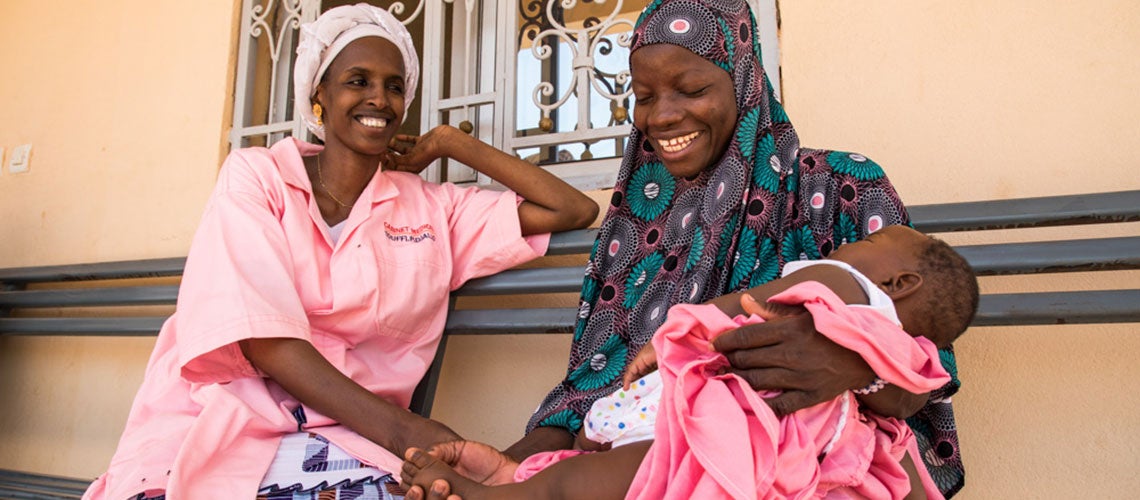 In Mali, women no longer need to leave births up to God
In Mali, women no longer need to leave births up to God
In developed countries, some women, especially young women, are increasingly complaining about the extreme medicalization of childbirth. Some decide that they do not want to know the sex of their child, while others choose to give birth at home, with a midwife and no epidural. But there are also women, who, for the sake of convenience, would rather arrange the day and time of birth and opt to have a cesarean delivery for non-medical reasons. Furthermore, scientific progress has triggered endless ethical debates on issues that have shaken up society, such as medically assisted procreation. These phenomena are showing me the changes that can occur when access to health care is constantly improving and offering a wider range of options.
But that is not how it works in my native country of Mali. Unless you know the signs or see a round stomach, pregnancies are not openly discussed. Even though it is no longer really a taboo subject, it is a cultural norm. Pregnant women must remain discreet and vague.
I remember a friend whom I was always teasing because I thought she looked pregnant. But she denied it until she could no longer hide her stomach, even beneath the roomiest boubous. Because speaking about it could have brought bad luck.
Yet, bad luck is not only tied to superstitions...
Alarming figures for Mali
While working at the United Nations Population Fund (UNFPA), I realized that most rural women faced three chronic shortages: a lack of access to prenatal and postnatal care, a lack of skilled personnel, and a lack of equipment.
I have heard it said so many times, "I am not going for prenatal checkups, I'll leave it up to God," because, for these pregnant women, going to see a health worker means traveling several kilometers. At any rate, that is the case outside of the big cities.
In 2016, there were 2,657 midwives and obstetric nurses in the entire country, a ratio of 1.4 midwives for every 10,000 people. In more general terms, with 5.2 health workers per 10,000 people, Mali was below the World Health Organization (WHO) recommended standard of 23 health workers per 10,000 people.
The vastness of the territory makes this ratio even worse in rural areas, because the majority of midwives (51%) work in the capital and in the regional capitals, especially Koulikoro and Ségou. The numbers speak for themselves. The ratio is one midwife per 1,840 people in Bamako, compared to one per 10,660 in Kayes (west) and one per 43,710 in Taoudéni (north). The assisted childbirth rate in Bamako is 97.4%, against just 20% in rural areas.
I also noticed another challenge: early pregnancies. Although they have more high-risk pregnancies because of their young age, adolescent girls in some communities still have less access to care than adult women. Because they lack experience or, in some cases, because health centers are not adequately equipped to provide services to pregnant girls, these girls are reluctant to seek care there.
And yet, in light of their limited resources and isolation, these disadvantaged adolescent girls and women should be the top priority for public health policies.
An appropriate solution to isolation
When I was offered the opportunity to launch the information campaign for a new project—the Sahel Women’s Empowerment and Demographic Dividend (SWEDD) project—I didn’t hesitate for a moment. I was delighted to be given a chance to make a difference.
From the time I attended my first major international meeting organized by UNFPA in July 2014 until the project was launched in November 2015, I have learned a lot about SWEDD and have been a part of its growth...like a baby.
I left UNFPA a few years ago to join the World Bank team in the Bamako country office. As SWEDD is being financed by the Bank, I have been able to continue working on this project and observing its impact on the lives of women and adolescent girls.
I believe in the SWEDD’s approach, which seeks to deploy more midwives in rural and periurban areas. This has the twin advantage of reducing maternal, newborn, and child deaths and narrowing the disparities in underserved areas.
Since June 2018, the project had facilitated the hiring of 105 midwives in Mali and the opening of 14 private practices, a figure that may seem low, but is, in my view, a major step forward when I see the impact of their training and their presence in communes that had no medical facility. This represents a 17% increase in the number of midwives working in the targeted regions and an 8% increase nationwide.
In recent months, the project’s teams that regularly visit the 13 communes on the outskirts of Bamako and the Koulikoro, Sikasso, and Ségou regions where the project is being implemented told me that after a mere three months in operation, the practices had already created 85 jobs, provided 2,700 curative health care consultations, and facilitated 265 prenatal consultations and 115 deliveries. They have also treated 800 cases of child illness and organized outreach workshops for 2,000 women to inform them of the benefits of prenatal and postnatal visits and infant nutrition.
I sometimes accompany my colleagues on their visits. In Mamaribougou in the Koulikoro region, I met Diallo Fatoumata Diallo, one of the midwives who recently opened a practice with support from the SWEDD project. She told me that she had chosen this village because she had grown up with her parents nearby and had firsthand knowledge of the challenges faced by pregnant women and mothers who had to walk several kilometers for their checkups or to seek treatment for their children. With an almost 5% uptick each month in the number of visits to her practice, she has no doubt that she made the right choice settling here.
It is gratifying to see that the SWEDD project is making a small difference in the lives of thousands of women and girls every day in the seven countries in which it is being implemented (Benin, Burkina Faso, Chad, Côte d’Ivoire, Mali, Mauritania, and Niger).


Join the Conversation